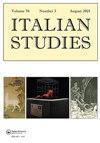Boccaccio and the Consolation of Literature
IF 0.2
3区 文学
0 HUMANITIES, MULTIDISCIPLINARY
引用次数: 1
Abstract
manage and produce social and moral order, examining the extent to which rhetorical strategies and fiction can preserve this order and avoid danger. Grace Delmolino’s essay examines the gendered dynamics of IX, 7. She presents a non-misogynist reading of the tale and argues that the tale leads us to understand that the agency of all parties and the avoidance of both tyranny and servitude is essential in the foundation of social order. Johnny L. Bertolio examines IX, 8 beyond the apparent comic fiction, as a depiction of civic, moral, and bodily disorder through his reading of the tale in parallel both with Dante’s Inferno and the biblical metaphor of ‘wine of wrath’. Albert Russell Ascoli’s article on the ninth tale examines the figure of Solomon in contrast with the tale’s narrator Emilia. Situating the tale within the microtext, he argues that this understudied tale is an overlooked and essential point of consideration in the critical trend of examining Emilia. In his view, Emilia represents an interpretive and political contradiction in her simultaneous power and defence of the misogyny that challenges that power; as such, she is shown to be central to Boccaccio’s investigation of governance in the Decameron. The final essay in the volume, penned by Max Matukhin, presents a close reading of IX, 10 and an intertextual study of its various antecedents. Matukhin’s investigation reveals that Dioneo subverts the medieval understanding that sodomy was a practice of the upper class and intellectuals as a result of excessive learning, by having a rural Puglian priest demonstrate a corrective to a sodomy born of ignorance. This collection of thought-provoking essays on the ninth day of the Decameron makes a significant contribution to existing critical literature, through the continuation of the Lectura’s project of ensuring neglected tales, and indeed a neglected day, are brought centre stage. The volume offers a renewed perspective of the ninth day as a diverse and yet cohesive collection of tales and provides an insightful investigation of the role of the ninth day in the macrotext, through both the perceptive contributions regarding the individual novelle and the innovative addition of the highly productive introductory essay by the volume’s editors.薄伽丘与文学的慰藉
管理和产生社会和道德秩序,研究修辞策略和小说在多大程度上可以保持这种秩序并避免危险。格蕾丝·德尔莫里诺(Grace Delmolino)的文章考察了第九章、第七章的性别动态。她对这个故事进行了非厌女主义的解读,并认为这个故事让我们明白,各方的代理以及对暴政和奴役的避免是社会秩序基础的关键。Johnny L. Bertolio考察了第九章,第八章,超越了明显的喜剧小说,作为对公民,道德和身体混乱的描述,通过他阅读的故事与但丁的地狱和圣经的隐喻“愤怒的酒”并行。阿尔伯特·罗素·阿斯科利在关于第九个故事的文章中考察了所罗门的形象,并与故事的叙述者艾米莉亚进行了对比。他认为,在审视《艾米莉亚》的批判趋势中,这个未被充分研究的故事是一个被忽视的重要考虑点。在他看来,艾米莉亚代表了一种解释性和政治性的矛盾,她同时拥有权力,同时又为挑战这种权力的厌女症辩护;因此,她被证明是薄伽丘在《十日谈》中对治理的研究的核心。卷中的最后一篇文章,由马克斯·马图欣(Max Matukhin)撰写,提出了对第九章、第十章的仔细阅读,并对其各种前文进行了互文研究。Matukhin的调查显示,Dioneo颠覆了中世纪的理解,即鸡奸是上层阶级和知识分子的行为,是过度学习的结果,通过一个农村的Puglian牧师示范纠正无知产生的鸡奸。这本关于十日谈第九天的发人深省的文集对现有的批评文学做出了重大贡献,通过延续讲座的项目,确保被忽视的故事,实际上是被忽视的一天,被带到中心舞台。该卷提供了一个新的视角,第九天作为一个多样化的,但有凝聚力的故事集,并提供了一个富有洞察力的调查第九天的角色在宏观文本中,通过对个人小说的敏锐贡献和创新的增加高产的介绍文章的卷的编辑。
本文章由计算机程序翻译,如有差异,请以英文原文为准。
求助全文
约1分钟内获得全文
求助全文
来源期刊

Italian Studies
Multiple-
CiteScore
0.40
自引率
0.00%
发文量
47
期刊介绍:
Italian Studies has a national and international reputation for academic and scholarly excellence, publishing original articles (in Italian or English) on a wide range of Italian cultural concerns from the Middle Ages to the contemporary era. The journal warmly welcomes submissions covering a range of disciplines and inter-disciplinary subjects from scholarly and critical work on Italy"s literary culture and linguistics to Italian history and politics, film and art history, and gender and cultural studies. It publishes two issues per year, normally including one special themed issue and occasional interviews with leading scholars.The reviews section in the journal includes articles and short reviews on a broad spectrum of recent works of scholarship.
 求助内容:
求助内容: 应助结果提醒方式:
应助结果提醒方式:


